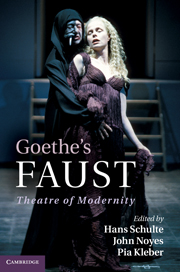Book contents
- Frontmatter
- Contents
- List of illustrations
- List of contributors
- Preface
- List of abbreviations
- Introduction
- PART I MODERNITY
- PART II THEATRE
- 13 Goethe's Faust: theatre, meta-theatre, tragedy
- 14 Faust beyond tragedy: hidden comedy, covert opera
- 15 Theatricality and experiment: identity in Faust
- 16 Rhetorical action: Faust between rhetoric, poetics and music
- 17 Directing Faust: an interview
- 18 A contradictory whole: Peter Stein stages Faust
- 19 Re-thinking and staging Goethe's Faust at the State Theatre Stuttgart 2005–6
- 20 Strehler's Faust in performance
- Select bibliography
- Index
- References
15 - Theatricality and experiment: identity in Faust
Published online by Cambridge University Press: 01 June 2011
- Frontmatter
- Contents
- List of illustrations
- List of contributors
- Preface
- List of abbreviations
- Introduction
- PART I MODERNITY
- PART II THEATRE
- 13 Goethe's Faust: theatre, meta-theatre, tragedy
- 14 Faust beyond tragedy: hidden comedy, covert opera
- 15 Theatricality and experiment: identity in Faust
- 16 Rhetorical action: Faust between rhetoric, poetics and music
- 17 Directing Faust: an interview
- 18 A contradictory whole: Peter Stein stages Faust
- 19 Re-thinking and staging Goethe's Faust at the State Theatre Stuttgart 2005–6
- 20 Strehler's Faust in performance
- Select bibliography
- Index
- References
Summary
The self, known in Western thought primarily as the soul, became, particularly under the influence of Rousseau, interiorized in the second half of the eighteenth century. Troubled by the moral irresponsibility that accompanies identity so interiorized that it is unknowable to itself, Goethe explored alternative models of selfhood from the early 1770s on. Werther analyses the solipsism of the modern self, while Egmont offers a notion of theatrical identity – the self as a role to which one commits, at least for a time. The questions surrounding Faust's identity have always been central to the Faust legend: the Faust of the chapbook is, after all, a sinner who barters his soul for knowledge. One way to think of the modernity of Faust is to say that Goethe substitutes interiorized identity for soul, and self-knowledge for knowledge in the traditional schema.
The questions that have swirled around the morality of striving in the Faust scholarship might be better understood as problems that Goethe recognized with modern subjectivity. An unknowable self can only develop blindly at the behest of nature; it will inevitably come into conflict with a social world predicated on the control that arises from self-knowledge. The Lord of the ‘Prologue in Heaven’ locates Faust's capacity for salvation in his participation in the eternal motion of a nature that never stands still but always changes in time.
- Type
- Chapter
- Information
- Goethe's FaustTheatre of Modernity, pp. 235 - 252Publisher: Cambridge University PressPrint publication year: 2011



